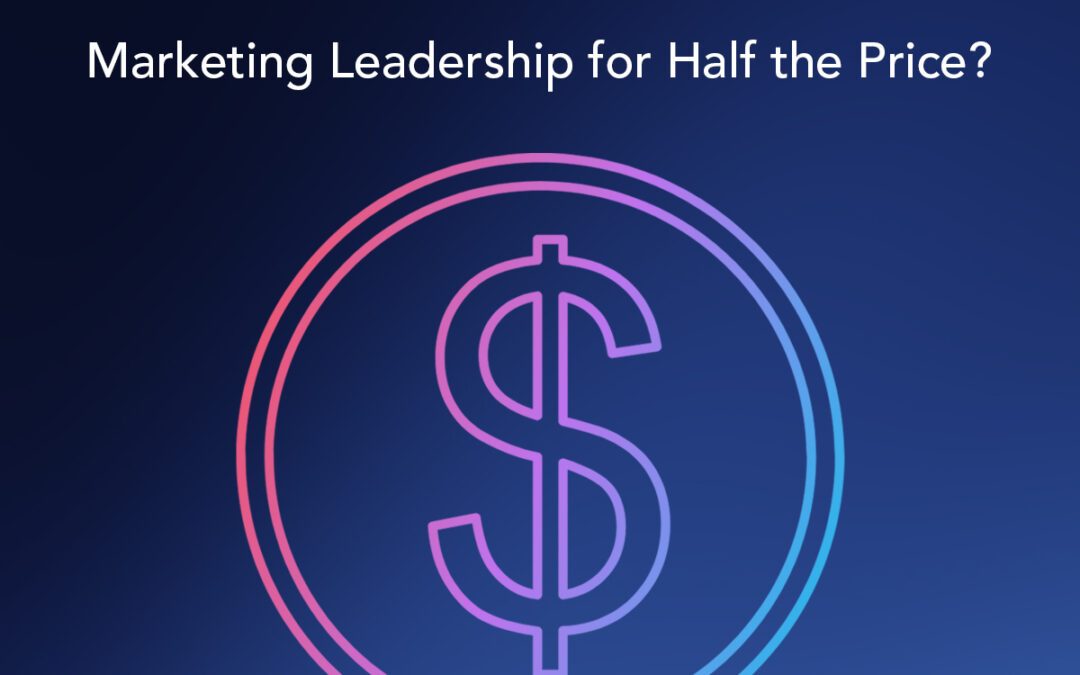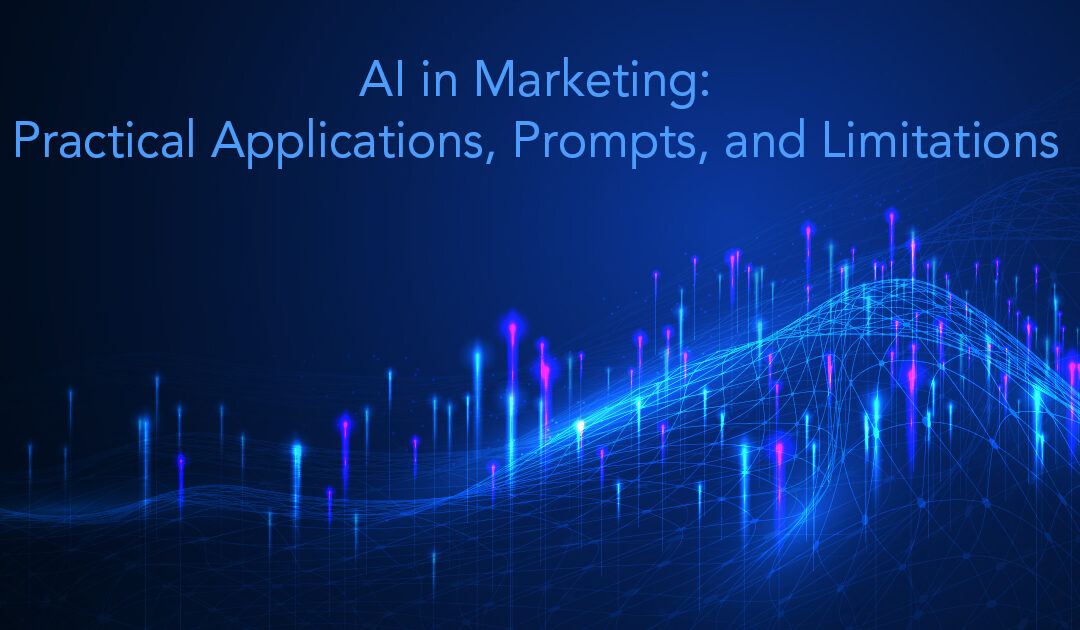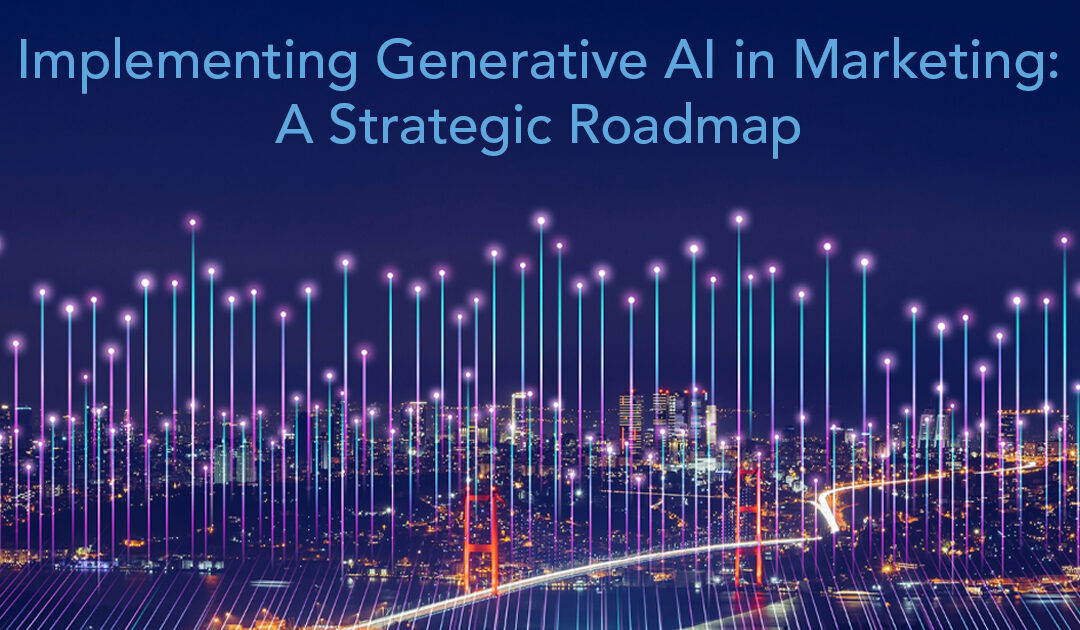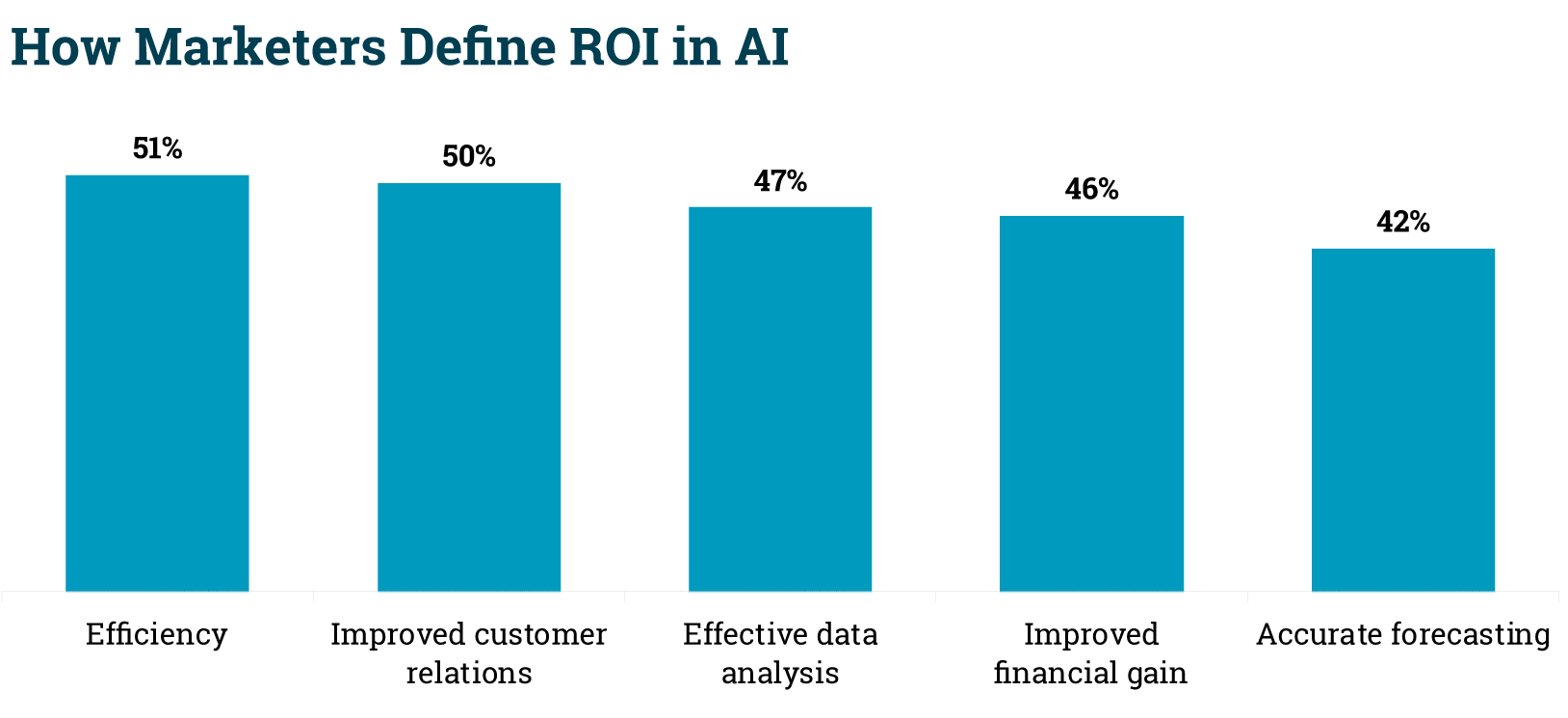
by Lori Berson | Aug 11, 2025 | AI, artificial intelligence, Marketing, Marketing Strategy
Key Takeaways
The Hidden Costs of Full-Time Marketing Hires
- Full-time CMOs cost $400K+ when you factor in salary, benefits, recruiting fees, and churn risk.
- Average marketing executive tenure is just 3+ years, creating expensive revolving door scenarios.
- 3-6 months of onboarding time means lost momentum while competitors advance.
- Single perspective limits strategic options and channel expertise.
Fractional CMOs Deliver Executive Strategy Without Executive Overhead
- 60-80% cost savings compared to full-time hires with immediate productivity.
- Cross-industry experience brings fresh insights and proven frameworks.
- AI-powered efficiency multiplies impact through smart automation and ethical data usage.
- Scalable engagement adapts to business needs without long-term commitment.
Strategic Channel Management and AI Integration
- Expert-level channel management prevents costly trial-and-error approaches.
- Ethical AI integration combines automation efficiency with authentic human creativity.
- Fractional marketers leverage analytics, content automation, and behavioral optimization.
- Technology stack expertise includes marketing automation, analytics, and specialized AI tools.
Risk Mitigation and Growth Acceleration
- Project-based engagement reduces hiring risk while maintaining strategic leadership.
- Documented processes and knowledge transfer prevent tribal knowledge loss.
- Portfolio company approach optimizes resources for faster decision-making.
- Growth-stage expertise helps companies scale marketing infrastructure efficiently.
The Bottom Line: ROI That Matters
- Fractional marketing leadership offers executive-level thinking with startup agility.
- Smart spending beats big spending when guided by strategic expertise and AI integration.
- Companies leveraging fractional talent build competitive advantages while competitors struggle with overhead.
- Cost comparison calculator shows the real financial impact.
The average marketing executive tenure has shrunk to just over three years, while the cost of hiring and losing them has skyrocketed. But what if I told you there’s a smarter way to get world-class marketing leadership without the executive price tag or the executive-sized risk?
The Hidden Costs of Full-Time Marketing Hires vs. Fractional Marketing Leadership
When you’re sizing up that shiny new marketing candidate, the salary is just the tip of the iceberg. Here’s what is lurking beneath the surface:
The Real Math:
- Base salary: $150K-$300K+ annually.
- Benefits package: Add 25-30% on top.
- Equity/bonuses: Another 10-20%.
- Recruiting fees: 20-30% of first-year salary.
- Onboarding and ramp-up time: 3-6 months of productivity loss.
- Risk of churn: If they leave within 18 months, multiply everything by 1.5x.
Suddenly, that $200K hire becomes a $400K+ gamble. And that’s assuming they stick around long enough to deliver results.
But here’s the kicker: while you’re playing this expensive waiting game, your competitors are moving. Fast.
Why Fractional Marketers Deliver Immediate Impact and Startup Agility
A fractional marketer isn’t a compromise; it’s an upgrade to how smart businesses think about talent acquisition.
Picture this: You get a seasoned marketing executive who’s already battle-tested across multiple industries, armed with the latest AI tools and automation strategies, ready to hit the ground running from day one. No six-month learning curve. No cultural onboarding drama. No equity dilution.
What you actually get:
- Immediate impact: They’ve solved your exact problems before, probably last quarter.
- Cross-pollinated insights: Fresh perspectives from B2B SaaS, e-commerce, professional services, and beyond.
- AI-powered efficiency: Fractional marketers leverage automation and AI to multiply their impact exponentially.
- Scalable engagement: Need 15 hours this month and 40 next month? Done. No HR negotiations required.
Maximizing ROI Through Strategic Channel Management and AI-Powered Marketing
Here’s where most companies stumble: channel management. Your full-time hire might excel at email marketing but struggle with paid social. Or they’re LinkedIn advertising wizards who can’t crack TikTok for B2B.
A fractional hire brings something different: strategic channel management backed by data from dozens of other businesses. They know which channels perform for companies like yours, which ones are oversaturated, and where the hidden opportunities lie.
More importantly, they’re not married to any single approach. They’ll kill underperforming channels without the emotional attachment that internal teams often develop.
The AI Integration Advantage: Where Ethics Meets Efficiency
As we all know, AI is reshaping marketing faster than most teams can adapt. The question isn’t whether to integrate AI, it’s how to do it ethically and effectively.
Fractional marketers who’ve stayed current bring something invaluable: they’ve already navigated the AI integration minefield with other clients. They know which tools deliver genuine ROI versus which ones are just expensive tech toys.
Smart AI integration includes:
- Personalization at scale.
- Content automation that maintains brand voice.
- Customer journey optimization based on real behavioral data.
- Ethical data usage that builds trust instead of destroying it.
The best part? They implement these systems and train your team to use them, so the value compounds long after their engagement.
Authentic Human Creativity: The Irreplaceable Element
Here’s where the magic happens and where many businesses get it wrong. AI can optimize, automate, and analyze, but it can’t replace authentic human creativity and strategic thinking.
A fractional marketer bridges this gap perfectly. They use AI to handle the heavy lifting while focusing their human expertise on the creative and strategic elements that actually drive business growth:
- Crafting brand narratives that resonate emotionally.
- Identifying market positioning that competitors can’t easily replicate.
- Developing creative campaigns that cut through the noise.
- Building authentic relationships with key audiences and partners.
This combination, AI efficiency plus human creativity, is where the real competitive advantage lives.
Fractional Marketing Leadership vs. Full-Time Hire: Numbers Don’t Lie
We’ve built a Cost Comparison Calculator that breaks down the real financial impact of a fractional versus a full-time marketing hire. Spoiler alert: the difference isn’t just significant, it’s often transformational for your cash flow and growth trajectory.
Quick preview of what our calculator reveals:
- Total cost savings: Often 60-80% compared to full-time hires.
- Time to productivity: Weeks instead of months.
- Risk mitigation: Project-based engagement versus long-term commitment.
- Flexibility factor: Scale up or down based on actual business needs.
👉 Run the numbers yourself here.
Think Like a Portfolio Company: Fractional Marketing for Scalable Growth
The smartest private equity firms and venture capitalists figured this out years ago. Instead of loading each portfolio company with full-time executives, they deploy fractional talent strategically across their investments.
Why? Because it works.
- Faster decision-making: No layers of bureaucracy or territorial politics.
- Cross-portfolio learning: Best practices travel quickly between companies.
- Resource optimization: Capital goes toward growth, not overhead.
- Risk management: Easier to pivot or change direction when needed.
You can adopt this same strategic thinking without the PE backing.
Brand Consistency Through Process-Driven Fractional Marketing Leadership
The answer might surprise you: fractional marketers often deliver more consistent branding than full-time hires.
Here’s why: They’re process-driven by necessity. They create systems, templates, and guidelines that outlast any individual. They document everything because they know knowledge transfer is critical.
Full-time employees? They often keep tribal knowledge in their heads, creating a massive risk when they inevitably leave.
The Modern Marketer’s Toolkit: AI, Automation, and Proven Frameworks
When you hire a fractional marketer, you’re not just buying hours, you’re buying access to an entire ecosystem:
Technology Stack Expertise:
- Marketing automation platforms.
- Analytics and attribution tools.
- AI-powered content tools.
- Social media management and listening platforms.
- Advanced email marketing and personalization systems.
Network Access:
- Vetted freelancers and agencies across every specialty.
- Industry connections for partnerships and collaboration.
- Technology vendors with established relationships.
- Other fractional experts for specialized projects.
Proven Frameworks:
- Go-to-market strategies tested across industries.
- Content calendars and campaign templates.
- Lead nurturing sequences that convert.
- Attribution models that track real ROI.
Overcoming Challenges With Fractional Marketing Leadership
Fractional marketing leadership isn’t always perfect. Here are the potential pitfalls and how to avoid them:
- Potential Challenge: Divided Attention Solution: Set clear expectations about availability and communication cadence upfront.
- Potential Challenge: Cultural Integration Solution: Choose fractional marketers who prioritize cultural alignment and invest time in understanding your company values.
- Potential Challenge: Knowledge Transfer Solution: Insist on documented processes and regular team training as part of the engagement.
The key? Choose a fractional marketer who’s transparent about these challenges and has systems in place to address them.
The Growth Company Advantage: Scaling Faster and Smarter
Here’s where fractional marketing leadership really shines: rapid scaling.
Growth companies face a unique challenge. They need a sophisticated marketing strategy, but their needs change quickly. What works at $2M ARR might be completely wrong at $10M ARR.
Fractional marketers thrive in this environment because they’ve scaled companies before. They know which systems to build, which processes to automate, and which strategies to deploy at each stage of growth.
More importantly, they’re not trying to justify their full-time job; they’re trying to deliver measurable results that justify the engagement.
Making the Decision: Framework for Success
Ready to explore fractional marketing leadership? Here’s your decision framework:
Green Light Indicators:
- Marketing budget of $50K+ annually.
- Need for strategic leadership within 30 days.
- Growth goals that require specialized expertise.
- Budget constraints that make full-time hires challenging.
- Recent bad experiences with marketing hires.
Proceed with Caution If:
- You need someone in the office daily for cultural reasons.
- You’re not ready to invest in proper tools and systems.
- Leadership isn’t aligned on marketing priorities.
The Bottom Line: ROI That Actually Matters
The businesses winning in today’s market aren’t just spending more on marketing; they’re spending smarter. They’re leveraging fractional expertise, AI integration, and authentic human creativity to build competitive moats that are hard to replicate.
The question isn’t whether you can afford a fractional marketer. The question is whether you can afford not to explore this option while your competitors gain ground.
Three actions to take this week:
- Run the numbers – See exactly what fractional marketing leadership could save you.
- Audit your current marketing challenges – Where are you stuck, and what expertise would unlock progress?
- Start the conversation – Even if you’re not ready today, understanding your options puts you ahead of the curve.
The future of marketing leadership is flexible, AI-enabled, and results-driven. Companies that adapt to this new model won’t just survive, they’ll thrive while their competitors struggle with outdated hiring practices and bloated overhead.
Ready to explore how fractional marketing leadership could accelerate your growth? Schedule a quick consultation or email Lori at lberson@BersonDeanStevens.com to discuss your specific situation and goals.
BersonDeanStevens (BDS) has been developing creative, results-driven marketing strategies, content, campaigns, and programs for over 25 years. And, we bring the knowledge and expertise to incorporate AI when necessary to gain efficiencies and help boost results. Whether you’re looking for a fractional CMO, need assistance when your internal workforce is overloaded, or need consulting from time to time, BDS is the perfect go-to resource. Client list.

by Lori Berson | Jul 1, 2024 | AI, artificial intelligence, Marketing, Marketing Strategy
Artificial Intelligence (AI) is revolutionizing every aspect of marketing, offering a range of practical applications that can streamline processes, enhance personalization and customer engagement, and improve decision-making. However, it’s essential to understand both the benefits and limitations of AI to leverage its full potential effectively. Below are some of the practical applications of AI in marketing and the constraints to be aware of.
Practical Applications
- Data Cleaning
AI tools can automate the process of cleaning and organizing large datasets, ensuring accuracy and reliability for analysis.
Prompt: “Clean and standardize this dataset of customer contact information, removing duplicates and formatting inconsistencies.“
-
Accelerating Creativity and Ideation
AI can help brainstorm ideas for content, ad campaigns, and more, providing fresh perspectives and reducing creative blocks.
Prompt: “Provide five unique content ideas for a social media campaign promoting [product or service].”
-
Personalized Outreach
AI enables personalized email marketing campaigns by analyzing customer data to tailor messages.
Prompt: “Create a personalized email template for customers who have abandoned their shopping carts.”
-
Refreshing Content
AI can update and repurpose existing content to keep it relevant and engaging.
Prompt: “Revise this two-year-old blog post to include the latest 2024 industry trends and data.”
- Sentiment Analysis
AI tools can analyze customer feedback and social media posts to gauge public sentiment toward a brand or product.
Prompt: “Analyze the sentiment of these customer reviews and summarize the overall customer perception for our latest product release.”
-
Chatbots
AI-powered chatbots can handle customer inquiries, provide support, and enhance user experience on websites.
Prompt: “Set up a chatbot script to handle common customer service questions about shipping and return policies.”
-
Meeting Note Transcriptions
AI can transcribe and summarize meeting notes, making information easily accessible and actionable.
Prompt: “Transcribe and summarize the key points from this marketing team meeting recording.”
-
Video and Audio Editing
AI tools can edit video and audio files, adding effects, transitions, and enhancements quickly and efficiently.
Prompt: “Edit this video footage to create a 30-second promotional clip, including background music and captions.”
Prompting Tips
- Explain the task or problem as you would to a person. Treat AI as your assistant.
- Use examples to illustrate what you want.
- Give the model a “role” and tell it about your target audience.
- For detailed prompting tips, download our Prompting Frameworks.
Limitations of AI
- Factual Accuracy
- High-Level Strategy
- Reasoning and Logic
- Understanding Context
- Handling Uncommon Scenarios
- Humor
- Emotional Intelligence
- Consistency
- Representing Marginalized Groups
- Privacy
While AI is good for routine, repetitive, and data-driven tasks, it lacks the creativity, experience, and perception required to develop and implement viable, successful marketing experiences. Effectively using AI is all about balance; balance between the integration of AI and the experience and know-how of marketing professionals.
BersonDeanStevens (BDS) has been developing results-driven marketing strategies, content, campaigns, and programs for over 25 years. And, we bring the knowledge and expertise to incorporate AI when necessary to gain efficiencies and help boost results.
Whether you’re looking for a fractional CMO, need assistance when your internal workforce is overloaded, or need consulting from time to time, BDS is the perfect go-to resource.
Ready to take your marketing to the next level with AI? To get started, schedule a call or email Lori at lberson@BersonDeanStevens.com.
BersonDeanStevens has been a recognized brand strategy and marketing leader for over 25 years. We work in partnership with you to differentiate your brand and achieve your business goals. Client list.

by Lori Berson | May 29, 2024 | AI, artificial intelligence, Marketing, Marketing Strategy
Generative AI (GenAI) is quickly transforming marketing, enabling content creation, decision automation, and data-driven insights. Adopting it promises competitive advantages, as major companies actively explore and implement GenAI solutions. However, realizing GenAI’s full potential requires a strategic, well-planned implementation approach. Here are several key considerations to keep in mind.
Assess Your Readiness
Before adopting GenAI, honestly evaluate if your organization is ready. This goes beyond just having the technology. Your use of GenAI must align with your overall business goals. Do you have enough staff and funding? Are roles and processes clearly defined? Many companies lack combined AI and marketing expertise, so you may need to bring in outside talent.
Build a Data-Driven Culture
GenAI relies on high-quality data for accurate outputs. Companies should develop strong data practices around governance, quality control, and privacy. Treating data as a strategic asset, rather than an afterthought, will pay off for GenAI and overall decision-making. A comprehensive data strategy is essential.
Tailor Use Cases
Don’t just adopt generic GenAI solutions. Identify your real marketing needs that GenAI can address. Get input and buy-in from employees across different teams. Use cases should be customized to your unique challenges and opportunities. Make sure to gather continuous feedback and maintain transparent ethical standards when building solutions.
Plan for Scalability
While pilot projects prove concepts, GenAI’s true value comes from wide-scale deployment across the organization. Market leaders get more productivity, quality, and creativity gains from scalable implementations. Design your use cases to smoothly integrate into all marketing operations. Robust change management prepares everyone for the transformation.
Manage Risks
GenAI introduces new risks around compliance and cybersecurity. You should adhere to AI governance frameworks like NIST’s AI RMF and the EU AI Act. And implement “security-by-design” via practices like penetration testing to address AI’s unique cybersecurity risks.
Assess Expertise
GenAI’s implementation requires skills that blend AI and data science with deep marketing know-how. Since this skill set remains scarce, companies should supplement staff with fractional or contract marketing experts who can provide specialized leadership and cross-functional guidance throughout the implementation journey.
With careful strategy and preparation, GenAI can drive innovation, operational efficiencies, and a sustained competitive advantage. Those who get it right will be well-positioned to thrive in this exciting new era of data-driven, AI-enabled marketing.
Ready to integrate AI into your marketing? To get started, download our tip sheets and schedule a call or email Lori at lberson@BersonDeanStevens.com.
BersonDeanStevens has been a recognized brand strategy and marketing leader for over 25 years. We work in partnership with you to differentiate your brand and achieve your business goals. Client list.

by Lori Berson | Apr 16, 2024 | AI, artificial intelligence, Data, Marketing Strategy
Marketing’s measure of success is often boiled down to a single metric: Return on Investment (ROI). However, recent research commissioned by Iterable and conducted by Wakefield Research, and published by Ad Age, suggests a shift in how marketers perceive ROI from investments in Artificial Intelligence (AI).

Efficiency and Customer Relations: The New ROI Drivers
Unlike traditional views that align ROI directly with financial gain, today’s marketers are increasingly valuing efficiency and improved customer relations as primary indicators of ROI in AI initiatives. The study reveals that 51% of marketers define ROI through the lens of efficiency gains, underscoring AI’s role in streamlining operations and enhancing productivity. Furthermore, 50% of marketers connect ROI with the improvement of customer relationships, highlighting the potential of AI to personalize customer interactions and allow for deeper connections.
Data Analysis and Forecasting: Enhancing Decision Making
While financial gains are still significant, with 46% of marketers linking ROI to improved financial outcomes, there’s a noticeable shift towards valuing the strategic advantages of AI beyond direct monetary returns. Additionally, 42% of marketers see the value of AI in providing accurate forecasting, which can be pivotal in strategic decision-making.
Marketers’ Adoption and Attitudes Towards AI
With 91% of surveyed marketers already using AI technologies, the perception of AI as a transformative force rather than just a tool is gaining traction, yet only 37% see it as an essential skill they must master, despite widespread concern about keeping up with technological advancements.
The Future of AI in Marketing: Opportunities and Challenges
This shift in perspective is not just theoretical. Marketers report that AI contributes to better job performance and operational efficiency. Most believe AI opens doors to new positions rather than replacing jobs, with 69% viewing AI as a creator of opportunities.
The shift in ROI measurement underscores a broader transition in marketing—from a purely financial focus to a multi-dimensional strategy that includes efficiency, customer relationships, and data-driven decision-making. As AI technologies continue to advance, their role in reshaping marketing strategies and defining new success metrics will undoubtedly expand, offering both challenges and opportunities for marketers aiming to stay ahead in their fields.
About the Data: The results are based on a September 2023 survey of 1,200 marketers.
For help infusing AI into your workflows, schedule a call or email Lori Berson at lberson@BersonDeanStevens.com.
BersonDeanStevens has been a recognized brand strategy and marketing leader for over 25 years. We work in partnership with you to differentiate your brand and achieve your business goals. AI use cases and client list.

by Lori Berson | Feb 13, 2024 | AI, artificial intelligence, Marketing, Marketing Strategy
In the rapidly evolving world of marketing, artificial intelligence (AI) has emerged as a powerful tool, offering unprecedented capabilities to businesses aiming to enhance their content creation and overall marketing strategies. However, it’s crucial to acknowledge that AI, despite its advanced capabilities, is not a cure-all or magic bullet. It’s a tool that needs a well-thought-out marketing strategy to create transformative content.
AI offers the potential to generate content at scale, analyze data, automate tasks, and personalize marketing efforts in ways previously unimaginable, but AI-generated content requires human direction, input, expertise, and editing. In and of itself, AI content is not always correct, often over-written and not written in context. To be successful with AI, you need someone driving the process.
At BersonDeanStevens (BDS), we understand the delicate balance between leveraging cutting-edge AI technologies and maintaining the human touch that is fundamental to creating marketing content that resonates with your audience. With over 25 years of experience in developing results-driven content, campaigns, and programs, BDS brings a wealth of knowledge and expertise to incorporate AI to boost results.
Whether you are looking for an ally to handle strategic content creation, help train your team on the proper use of AI, or need consulting from time to time, BDS is your go-to resource.
For help with AI and how to successfully integrate it into your business, schedule a call or email Lori Berson at lberson@BersonDeanStevens.com.
BersonDeanStevens has been a recognized brand strategy and marketing leader for over 25 years. We work in partnership with you to differentiate your brand and achieve your business goals. Client list.

by Lori Berson | Jan 11, 2024 | AI, artificial intelligence, Marketing, Marketing Strategy
Staying ahead of the marketing curve is not just an advantage, but a necessity – especially with Artificial Intelligence (AI). Below are just a few examples (and tools) of how AI can elevate every aspect of a marketing campaign, from targeted planning to insightful post-campaign analysis.
The integration of AI in marketing goes beyond automation. It’s a fundamental shift in how we conceptualize and execute marketing strategies. AI offers unparalleled efficiency, personalization, and scalability in campaigns, setting a new benchmark in marketing excellence.
Tailoring Campaigns with Precision: The Pre-Campaign Stage
AI-Driven Audience Targeting
AI’s capability to analyze and interpret complex data sets enables marketers to identify and target the most receptive audiences. This allows for highly targeted marketing campaigns that speak directly to the needs and interests of your audience.
Content Creation
Imagine a creative assistant that helps generate ideas, themes, and content. AI aids in creating diverse and appealing marketing materials, ensuring your message is both engaging and relevant.
Campaign Planning
AI tools can assist in campaign planning by predicting market trends and customer behavior, allowing marketers to stay ahead of the curve.
Engaging Customers: The Active Campaign Stage
Enhancing Customer Interaction
AI can personalize customer interactions by analyzing past behavior and preferences. This results in more engaging and relevant communications.
Real-time Campaign Optimization
AI’s ability to process data in real-time allows marketers to make on-the-fly adjustments to campaigns, ensuring maximum impact and efficiency.
Predictive Analysis for Better Results
AI’s predictive capabilities enable marketers to anticipate customer needs and respond proactively, creating a more dynamic and responsive marketing strategy.
Measuring Success and Learning: Post-Campaign
Insightful Analytics and Reporting
AI’s ability to process and analyze post-campaign data is invaluable. It provides detailed insights into what worked and what didn’t, paving the way for informed decision-making in future campaigns.
Content Lifecycle Management
AI isn’t just about creating content; it’s also about managing it effectively. From identifying the best-performing content to suggesting repurposing strategies, AI ensures your content continues to deliver value over time.
AI Tools
- Demandbase and 6Sense – Leverage AI and intent data to help identify high-value accounts and audiences to target to help with account-based marketing planning.
- Drift – An AI chatbot that can have conversational interactions with website visitors to engage prospects. Chatbot data helps inform campaign messaging and offers.
- Madkudu – Uses AI and machine learning to analyze customer data and make personalized recommendations for marketing campaigns – helping with segmentation and targeting.
- Adobe Sensei – AI inside Adobe marketing products like Adobe Campaign can assist with campaign planning and optimization by predicting performance and identifying high-value customers.
- Salesforce Einstein – AI that’s built into Salesforce to optimize the sending of email campaigns, provide predictive lead scoring, and automated personalization.
- ChatGPT, Claude, Bard, and Microsoft Copilot are general AI platforms that help you brainstorm ideas, and create outlines, articles, blog posts, social media, e-books, emails, ad copy, and more!
- Persado – Uses AI to generate emotionally intelligent marketing copy and subject lines that drive engagement for email campaigns and other messages.
- Midjourney, DALL-E, Canva, Kittl, and Adobe Firefly can rapidly create unique images to tell your story.
- Sprout Social and HootSuite – Use AI for image and text analysis to help make content recommendations and schedule social media campaigns.
The key is finding AI marketing tools that align with your goals, data sources, technical capabilities, and budget.
AI – Your Strategic Partner for Growth
AI is more than just a technological upgrade for your marketing; it’s a transformative power. It enables a level of precision, personalization, and efficiency previously unattainable. Whether it’s through smarter targeting, creative content generation, real-time personalization, or insightful post-campaign analysis, AI is an indispensable asset for modern marketers.
To achieve your marketing objectives more effectively and efficiently, we recommend you use AI not only in your marketing strategy but throughout your campaigns – in addition to using it for sales, project management, presentations, etc.
Stay tuned for more insights and tips on leveraging AI for unparalleled marketing success.
For help with your marketing and how to incorporate AI, schedule a call or email Lori Berson at lberson@BersonDeanStevens.com.
BersonDeanStevens has been a recognized brand strategy and marketing leader for over 25 years. We work in partnership with you to differentiate your brand and achieve your business goals. Client list.






